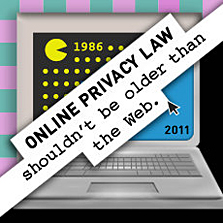
This week, our federal online privacy law turns 25. The ACLU is hosting a blog series that will address some of the many reasons why the "Electronic Communications Privacy Act of 1986" (ECPA) is in need of an upgrade! Spread the word using #UpdateECPA, and to learn more about your dotRights, visit www.aclu.org/ecpa.
What were you doing in 1986? Maybe you were wearing acid wash jeans, crimping your hair, or watching Wil Wheaton, River Phoenix, Corey Feldman, and Jerry O'Connell in 1986's Stand By Me. In 1986, Congress was enacting the law that protects the privacy of online communications, the Electronic Communications Privacy Act (ECPA).
Now, think for a second about the online communications of 1986. (I wasn't even born in 1986, so I can't really help you with that!) I can tell you, however, that, 25 years ago, there was no World Wide Web, almost nobody carried a cell phone, and the only "social networking" 2-year-old Mark Zuckerberg was doing was at preschool or on play dates. Lacking any distant-future-predicting abilities, Congress could not have even imagined the ever-advancing technological innovations to come.
Please note that by playing this clip You Tube and Google will place a long-term cookie on your computer. Please see You Tube's privacy statement on their website and Google's privacy statement on theirs to learn more. To view the ACLU's privacy statement, click here.
With all those advancements, you'd think Congress would have thought to update ECPA, right? Wrong — in the past 25 years, technology has advanced at breakneck speed while electronic privacy law remained at a standstill. Congress has not updated ECPA to protect the kind of electronic communication and records — including email, cell phone location records, Facebook posts, search history, cloud computing documents — that are common today. This means that the government can engage in a shopping spree in the treasure trove of information about who you are, where you go, and what you do, that is being collected by cell phone providers, search engines, social networking sites, and other websites every day.
Online privacy law shouldn't be older than me, and it certainly shouldn't be older than the Web. And Americans shouldn't have to choose between new technology and privacy. Unfortunately, privacy law doesn't auto-update. Join us in telling Congress members that ECPA is so 20th century and ask them to update ECPA today. And stay tuned for more throughout the week!
Learn more about online privacy: Sign up for breaking news alerts, follow us on Twitter, and like us on Facebook.
Stay informed
Sign up to be the first to hear about how to take action.
By completing this form, I agree to receive occasional emails per the terms of the ACLU's privacy statement.
By completing this form, I agree to receive occasional emails per the terms of the ACLU's privacy statement.


